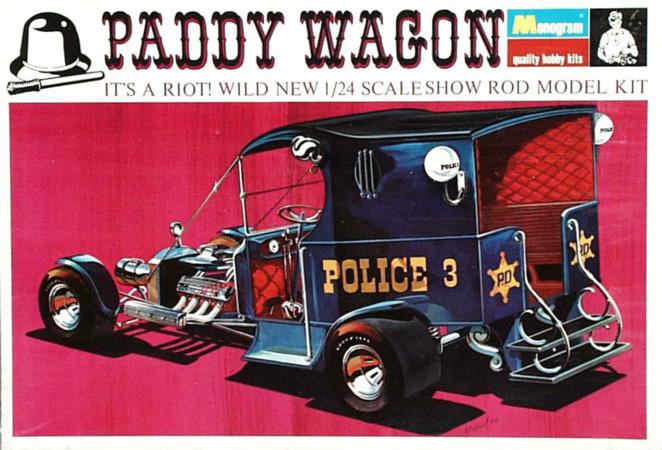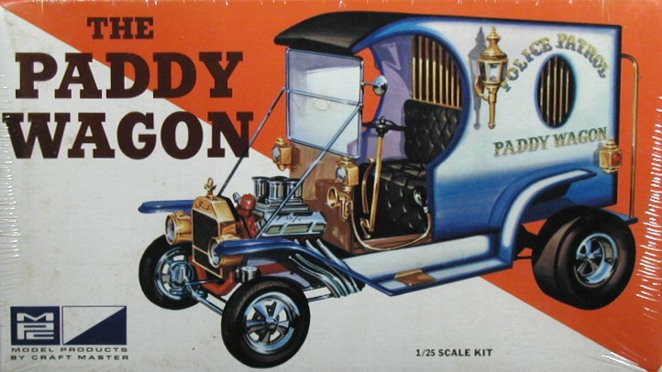 |
| facebook conversation - March 14, 2012 |
That got me thinking, was Doug correct? It sounds plausible, but I've known Doug for some 25 plus years and he's been known to try to pull one over on people.
So, off to the online dictionaries...
 |
| Miriam-Webster.com entry |
 |
| Dictionary.com entry |
 |
| Dictionary.com entry |
 |
| Dictionary.com entry |
Seems that Doug is right. But I wanted to see a photo of one. A bit more searching produced this, with a reference to the Irish Echo newspaper.
| Lifted from the Gilder Lehrman Center for the Study of Slavery, Resistance, & Abolition |
I think that this a modern photo that was grained up.
 |
| IrishEcho.com - June 09-15, 1999 |
A bit more information. But when did the term come into use? I'll get to that soon, but some other images caught my eye.
In 1968 Monogram produced a plastic model.
 |
| Image lifted from ShowRods.com |
MPC also came out with one that same year.
 |
| Image lifted from ShowRods.com |
The Word Detective says this:
Just Don't Get Me Started on "Welsh"So maybe Doug is half right. But when did it all start?
Dear Mr. Morris: Last Sunday afternoon, I heard a discussion on a radio talk show about the use of the term "paddy wagon". The host insisted that the term is a terrible slam against the Irish. He likened it to using "wop" against an Italian. A caller, who was Irish, disagreed, saying that the term "paddy" came about because of the nickname for the policemen who were nicknamed after St. Patrick and "wagon" just referred to the vehicle they used to pick up the people who were creating a disturbance. Can you shed any enlightenment? -- Jo Kozlowski, via the internet.
Certainly. I shed enlightenment the way my cat sheds fur -- in great orange clumps. I've never figured out, since we're on the subject (involuntarily, in your case), how cat fur ends up inside the microwave. Does he make popcorn the minute I leave the house? Is he whipping up dinner for all his pals while I'm gone? Is that where all the instant mashed potatoes went?
As far as your question goes, you have already heard the two likely answers, and no one knows which is the truth. The use of "paddy wagon" as a slang term for a police van dates back to the 1920's, and seems to have originated in either New York City or Philadelphia, cities which had both large Irish immigrant populations and largely Irish-American police forces during that period.
It is true that "Paddy," a familiar form of the common Irish name Padraic (or Patrick) was used in the 19th and early 20th centuries as a generic, and often uncomplimentary, term for an Irishman, both in the U.S. and England. But while "paddy" certainly was used as an insult in the past, and Irish immigrants were without doubt the victims of discrimination, I think that it takes a pretty thin skin to find a grave insult in the term "paddy wagon." Among other things, the fact that it remains unclear whether the "paddy" involved was the arresting officer or the miscreant being arrested rather clouds the logic of taking offense. That "paddy" is also used in non-pejorative contexts ("Saint Paddy's Day") has also largely robbed the word of its sting, which is not the case with words such as "wop," which have always been, and always will be, grave insults.
Looking through the Library of Congress' Chronicling America, I found a few early entries for "paddy wagon".
 |
| The Houston Daily Post - November 8, 1896 |
Here's an audio clip of William McKinley from 1896, courtesy of Archive.org.
 |
| St. Johns Review - May 29, 1908 |
But these seem to refer to the payoff of some election bet. Who would bet having to push someone around in a wheel barrow? I guess I've seen worse.
Wondering what could be found at Google Books? Three mentions of what one would conjure in their minds if they heard the words, Paddy Wagon. The police vehicle.
 |
| Newspaper reporting and correspondence by Grant Milnor Hyde (1912) |
 |
| The National Underwriter - Volume 21 (1917) |
 |
| Forest Leaves - November 18, 1920 |
What did other papers say about it?
 |
| Spokane Daily Chronicle - January 21, 1936 |
 |
| Meriden Record - December 24, 1938 |
There are many more instances of the term being used in the news.
So, where does that leave us? The term Paddy Wagon seems to have entered the reporters' vernacular in one meaning in 1896, but the more common usage doesn't show up in print (based on my research) until 1912. It then seems to be more wide spread in the 1930s. I personally haven't heard the term used for years.
Does this exercise pinpoint the origin? No. Does it perhaps shed some light? Sure. We'll go with that.

%20_%20The%20Gilder%20Lehrman%20Center%20for%20the%20Study%20of%20Slavery,%20R.png)
No comments:
Post a Comment